After a long two years, two months and 18 days plus one pandemic later, we were finally able to take a short holiday to the lovely tropical island of Fiji.
We had a brilliant time staying at the Shangri-La Yanuca Island resort – it felt like such a treat to be back in that tropical sunshine, in a pool and being the most relaxed we’ve been for a long time.

Our first view of paradise – the pool at Shangri-La in Fiji
Getting there was certainly a different process from our pre-Covid travels where we would just jump on a plane and off we’d go. Every destination seemingly now has its own set of tests, certifications, mask requirements and it can be seem too hard to do all of this just to go on holiday!
But fear not – here’s a quick overview of what we needed to do to travel to and from Fiji – yes it’s definitely more admin and paperwork but very much worth it!
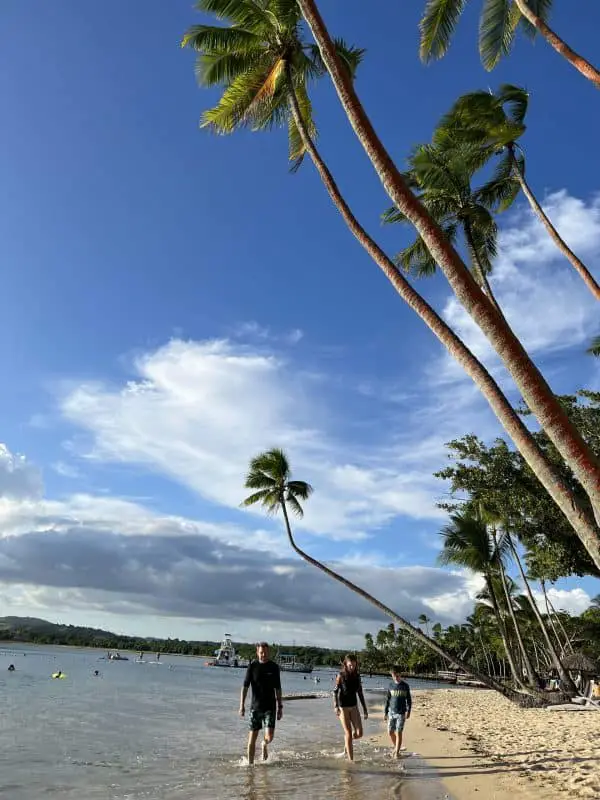
The lovely beach on the Coral Coast of Fiji
Fiji currently only allows quarantine travel for fully-vaccinated (aged 18+) travellers. Unvaccinated under-18s can travel with their parents/guardians with no quarantine requirements, however there are testing requirements outline below for over 12’s. (Note airline vaccination requirements may be different).
Contents
- 1 Step one: Book your return ticket
- 2 Step two: Book your accommodation
- 3 Step three: Get your travel insurance
- 4 Step four: Book your Fiji in-country RAT test
- 5 Step five: Fill out your New Zealand Traveller Declaration form
- 6 Step six: Obtain an international travel version of your Covid vaccine pass
- 7 Step seven: Get a pre-departure RAT test no more than 24 hours before your flight
- 8 Step eight: Show up with plenty of time to the airport
- 9 Step nine: Arrival in Fiji
- 10 Step ten: Heading home to New Zealand
- 11 TOP TIPS:
- 12 But what if you test positive for Covid while in Fiji?
- 13 The verdict
Step one: Book your return ticket
We flew Air New Zealand who currently have a requirement for all over-18s to be fully vaccinated against Covid-19 to fly.
They also require masks to be worn on the flight by over 12’s (our kids wear them every day at school anyway so it wasn’t an issue for them.)
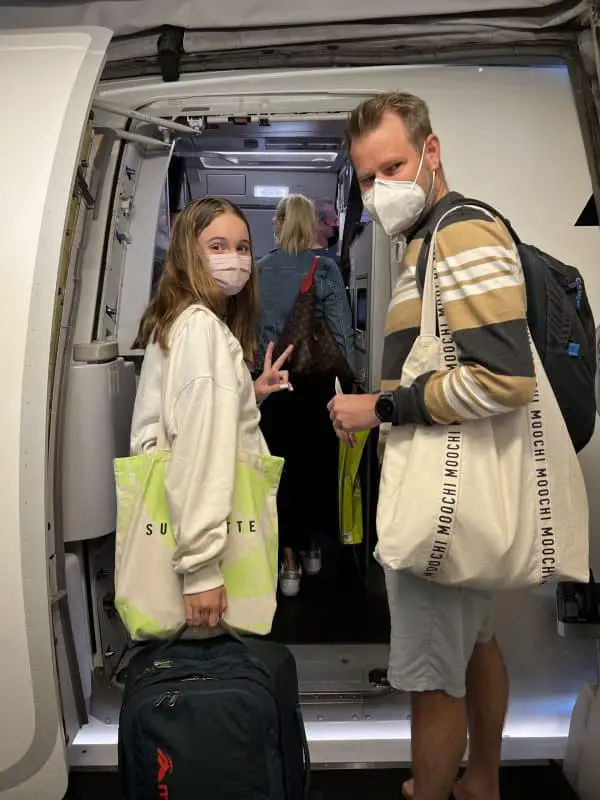
A special moment boarding that first international flight in ages!
Step two: Book your accommodation
Fiji requirements are loosening off all the time, however at the time of booking, we were required to book into a ‘Care Fiji Committed’ (CFC) accommodation provider – which is basically most resorts in the country.
This requirement has now been dropped so you can stay in AirBnB/homestay accommodation if you like.
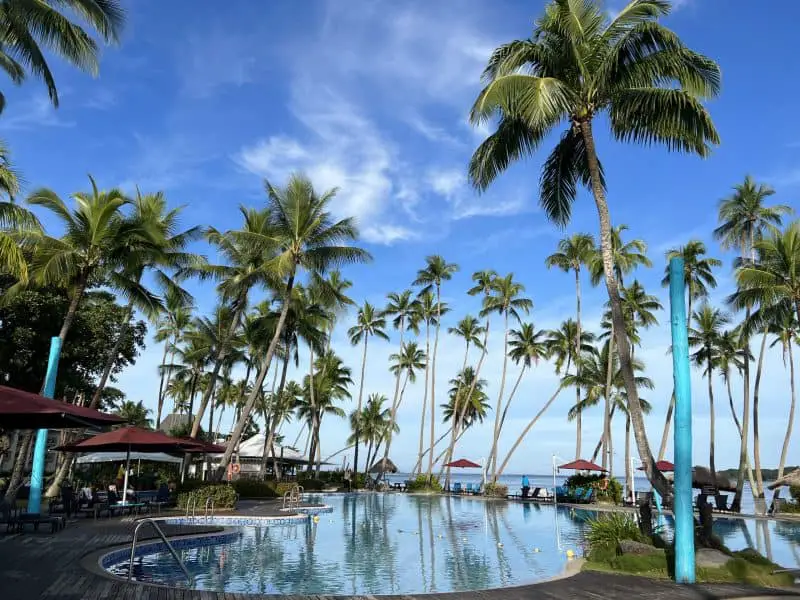
Early morning by the pool. We didn’t want to leave!
Step three: Get your travel insurance
To enter Fiji you must have travel insurance that has “full Covid-19 coverage”. This basically means it will cover the cost of any hospitalisation or quarantine costs at your resort if you are unlucky enough to test positive for Covid while away.
The good news is, unlike a few months ago, most travel insurance now covers this. We used Southern Cross Travel Insurance but Covermore and AA Insurance are also good comprehensive options.
What none of them cover is if the NZ government puts the country back into lockdown or re-introduces the MIQ system. So you need to decide if you are comfortable taking that risk (we obviously were!)
If for whatever reason, you can’t purchase travel insurance through a New Zealand insurer, you can purchase the Fijian government’s own FijiCare insurance here. https://www.fijivisitorsinsurance.com/
NB: We think it’s essential that you travel with insurance, however none of our insurance documents were ever checked either in New Zealand or Fiji despite this being a mandatory requirement…
Step four: Book your Fiji in-country RAT test
A mandatory Rapid Antigen Test is required for 12 years+ to be taken within 48-72 hours of arrival in Fiji. This must be booked online via this website BEFORE YOU TRAVEL – https://entrytestfiji.com/ and costs $48 FJD per person.
The great news is, most resorts are doing RATs onsite, so it’s a matter of dragging yourself out of the pool at your booked time, going for a quick RAT in a room at the hotel, then back to the pool. We didn’t even have to wait for results, the staff said they would notify us if we got a positive. If you are staying in private accommodation, there are many test centres where you can go to get it done.
This pre-booking was checked during the check-in process in New Zealand, and there are fines if you fail to do the test while in Fiji.
TOP TIP: You may find that the receipt goes to your main inbox, but the confirmation of your booking goes to your SPAM folder in your email. I spent a long time trying to find it, and helped a poor guy at check in who was freaking out because he hadn’t printed it out and couldn’t find it in his emails on his phone (it was in the spam folder).
Step five: Fill out your New Zealand Traveller Declaration form
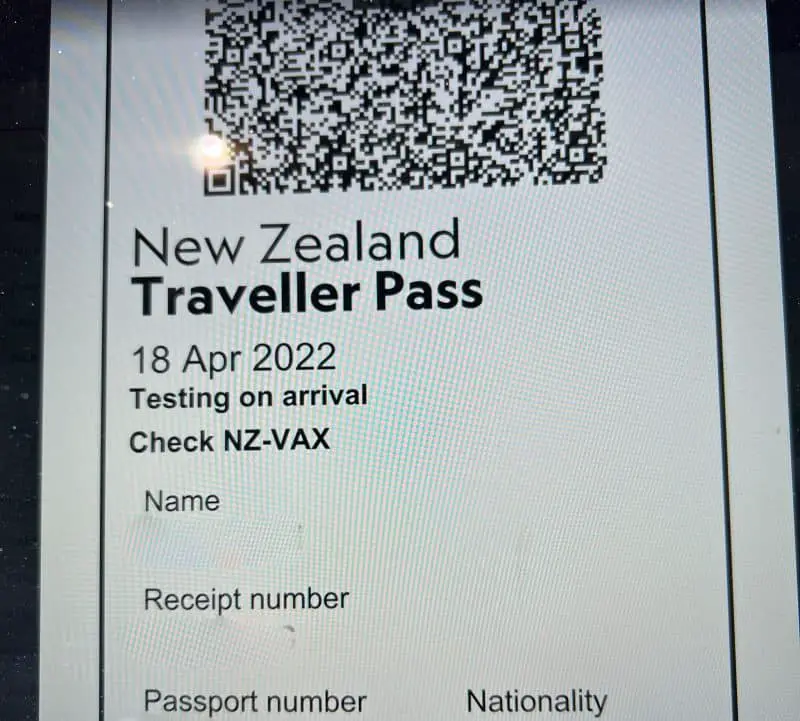
NZ Traveller Declaration Form (with details blanked out!)
For holiday purposes if you’re coming back within 30 days, you can pre-fill out your New Zealand Traveller Declaration form online here – https://www.travellerdeclaration.govt.nz/
It’s kind of annoying, because it simply repeats a lot of the information you fill out on the paper arrival card on your way back in, but I guess it’s so they can easily trace people at the moment.
You can save the form as you go, and it spits out a QR code at the end that you must show at check-in in Fiji to return to New Zealand.
Step six: Obtain an international travel version of your Covid vaccine pass
You need to obtain an International Travel Vaccination certificate for all over-18s (we did it anyway for our kids too).
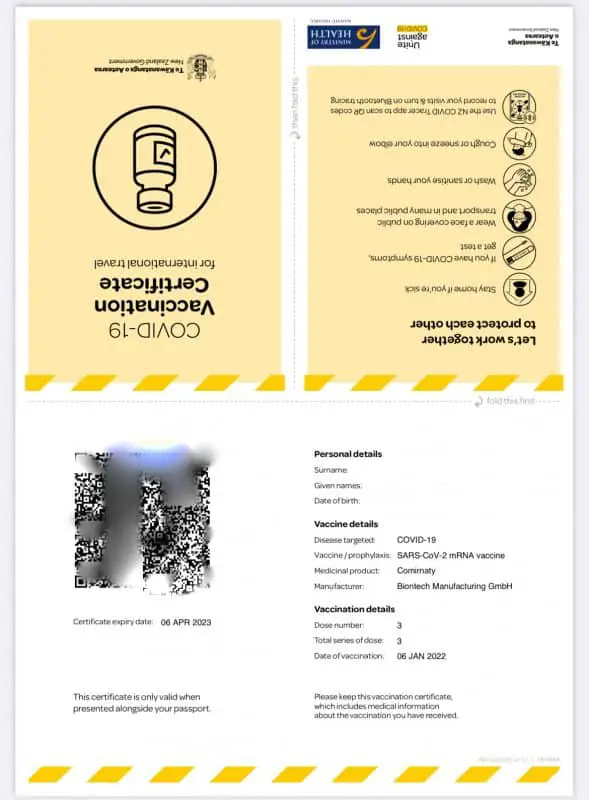
The international version of New Zealand’s vaccine pass
The vaccine pass that we use in New Zealand is not suitable for international travel. So visit https://covid19.govt.nz/covid-19-vaccines/vaccine-passes-and-certificates/proof-of-your-vaccination-status/ which has details on how to get an international version for travel.
It’s a straightforward process and takes about 5 minutes. This was checked during check-in in New Zealand, but not coming back from Fiji.
Step seven: Get a pre-departure RAT test no more than 24 hours before your flight
NOTE: THIS IS NO LONGER REQUIRED AS AT 1 MAY 2022. YAY! (I have left this information up here though, in case you need to find out about pre-departure RATS for other destinations…
Fiji requires a negative supervised RAT test and paperwork for entry that has been taken no more than 24 hours before your flight for over 12 year olds.
The 24 hour bit is non-negotiable – there is a Facebook post doing the rounds about someone who was denied boarding because the RAT was 24 hours and 10 minutes before departure time (not sure how true this is but who would want to risk it!)
While there are many walk-ins available, personally we pre-booked these tests as it was Easter and a lot of people were travelling. Be sure to shop around for prices, Kylie’s test was $50 NZD at Chemist Warehouse where as Mike paid $60 at Unichem. There are some private companies charging up to $100 for these tests!
We found the process quick and easy, and the pharmacists are well up to play with the paperwork required. They also double checked our flight times to be sure we were within the 24 hour limit.
Don’t forget to take your passport along as the pharmacist needs to record the number on your documentation and certify that it’s you taking the test.
We did the actual tests ourselves (unlike a PCR where the clinician shoves the stick up there!) however the pharmacist observes and does the handling of the solution and monitoring of the test.
After 15 minutes once you’ve (hopefully!) got that negative test – BREATHE! It’s the best feeling in the world to know that you’re good to go 🙂
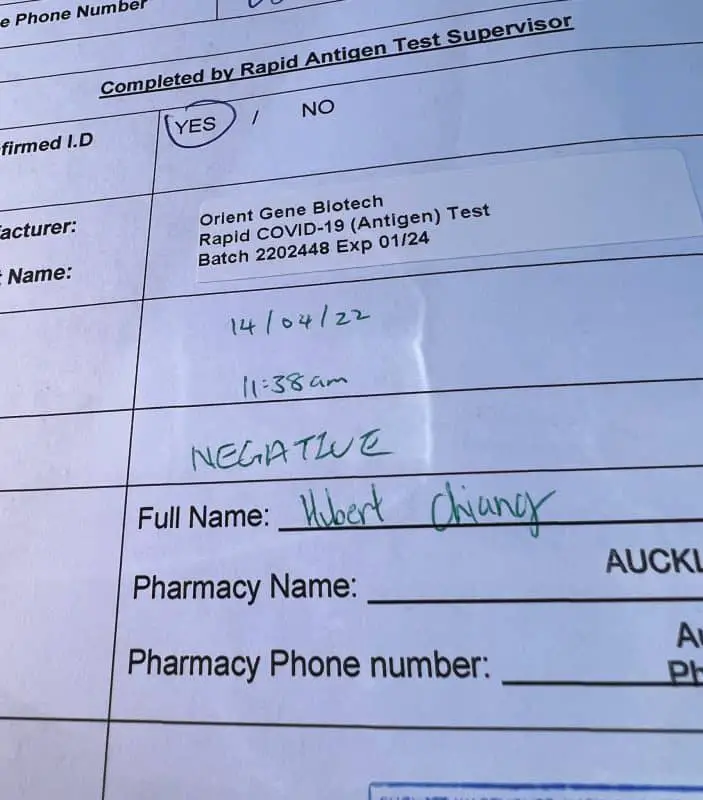
The supervised RAT paperwork
If you have had Covid within the previous 30 days, you are not required to have a negative pre-departure test to fly or take the day 2-3 arrival test, however you must have a ‘Fit to Fly’ certificate obtained from your medical practitioner. More info can be found here.
Step eight: Show up with plenty of time to the airport
For us, it was smooth sailing and we checked in with no problem or queues – but we did turn up 3.5 hours before departure. It took probably an additional 5 minutes on top of normal check-in for the agent to go through all the additional paperwork and there is currently no online check-in available for Fiji so you have to queue up even if you only have hand luggage.
The staff are great but learning too – there was a bit of confusion momentarily because our 11 years and 11 month old who looks about 14, did not have a pre-departure RAT, however once they looked up and confirmed it was all fine. The staff mentioned they’re having to keep on top of all these changing requirements that are different for every destination, so be patient and kind with them 🙂
If you are flying from Auckland International it’s worth noting it’s not yet fully operational. Many stores are closed and there are limited eateries open (only two when we flew on Good Friday), so either pre-eat or bring all the snacks.
Step nine: Arrival in Fiji
This was SO straightforward. As the majority of documentation is checked back in New Zealand, we just showed passports and did normal immigration procedure, there were no specific Covid documentation requirements.
Other than a quick day 2 RAT test on-site as detailed above, there were no other requirements needed during our time in Fiji.
Step ten: Heading home to New Zealand
The good news is – there isn’t really anything you need to do to prepare to come back to New Zealand after your holiday (if you’ve already done your New Zealand Traveller Declaration Forms). There are no pre-departure testing requirements to come back into New Zealand from Fiji at present (note this is only for Fiji and Rarotonga, travellers from Australia, UK/Europe, USA etc are currently required to do pre-departure testing).
We were advised by Air New Zealand via email to check-in four hours before our flight – this was overkill as there were hardly any queues but I guess it’s always better to be on the safe side…
On arrival in New Zealand we had to show our Traveller Declaration Form which customs scanned and we were given a pack with 3 x RATs in per person, with instructions to take a test on day 1 and day 5.
The next day you receive an email with a link to a short survey where you upload the results of your RATs. You receive an additional email on day 5. If you test positive then the quarantine process is the same as if you test positive normally (eg 7 day home quarantine). You are required to have a PCR test in addition, to monitor for any new variants via international travel.
TOP TIPS:
-The Covid-19 section of the Travelling to Fiji website – https://www.fiji.travel/covid-19/travelling-to-fiji will become your best friend, and is the official source of all requirements to travel. Check it frequently, so you’re up-to-date with changes and what’s needed.
-Print everything off! We are normally full-digital people, but honestly with all this extra paperwork it’s actually easier to have it in paper format to hand to staff, rather than trying to find it on your phone. It makes their life easier too and results in speedier check-in and processing. We had it all individually paperclipped in a folder and it worked well.
-Check your passport well in advance! Because it’s been two and a bit years since we’ve been able to use them, you want to ensure you have a valid passport with at least six months left on it. Even more so for kids, whos passports only have a five year life anyway.
But what if you test positive for Covid while in Fiji?
We got asked this a lot before we travelled and it does freak a lot of people out. If you test positive you will be required to quarantine for 7 days.
If you’re staying at a resort, they are generally very well set-up for this. You may be able to stay in your existing room and quarantine, or they have a series of rooms set aside for this purpose. They bring you room service and have medical staff or contacts available to assist if you get really sick. Note: you still need to pay for your additional stay and meal/healthcare costs so that’s why good travel insurance that covers this is essential!
We thought about it – and while it would be less than ideal to get Covid on our holiday, in some ways it’s a bad scenario if you’re at home and need to quarantine for 7 days anyway. At least this way we wouldn’t need to worry about cooking 😉
So we decided it was worth the risk, and if the worst happened then that’s life! We did take our work laptops just in case it happened so we could still work remotely if we were well. We also made sure we had lots of paracetamol/ibuprofen, throat lozenges, hydration tablets etc in our medical kit to help relieve symptoms in case we needed it. Thankfully we were all fine!
The verdict

So glad we got to experience some more beautiful Fiji sunsets
We were SO happy we took the plunge and did our trip to Fiji. After over two years of being grounded it was wonderful for the soul to take some time out from pandemic life and feel almost “normal” again.
Fiji is so reliant on tourism that they’ve done a great job with their systems and making travel as safe as it can possibly be at the moment. Mask wearing was prevalent amongst staff everywhere we went (airport, taxi driver, and resort staff). It’s mandatory to be vaccinated for all resort staff. 95% of everything we did was outside which additionally lowered the risk.
Sadly, the Fijian people have suffered really badly during the pandemic. They were hit badly by Delta, and many people we talked to said there was just no work when the borders closed, and minimal government assistance. They just had to survive the best they could, and it made us realise how very lucky we have been here in New Zealand with the assistance we’ve all had.
They are genuinely so happy to be back at work again and it’s really great to be able to support them by visiting. Our taxi driver on the way back to the airport told us how the streets surrounding the airport were lined with people when their international border reopened on 1 December and the following days. They were that happy to see flights landing again, and some semblance of hope returning to their country.
If you’re on the fence about taking a trip, our advice is just do it!
Let us know if you have any questions in the comments 🙂
Disclaimer: This information is correct as at April 2022. Covid 19 related requirements are constantly changing, so please be sure to check the latest updates before you travel.

